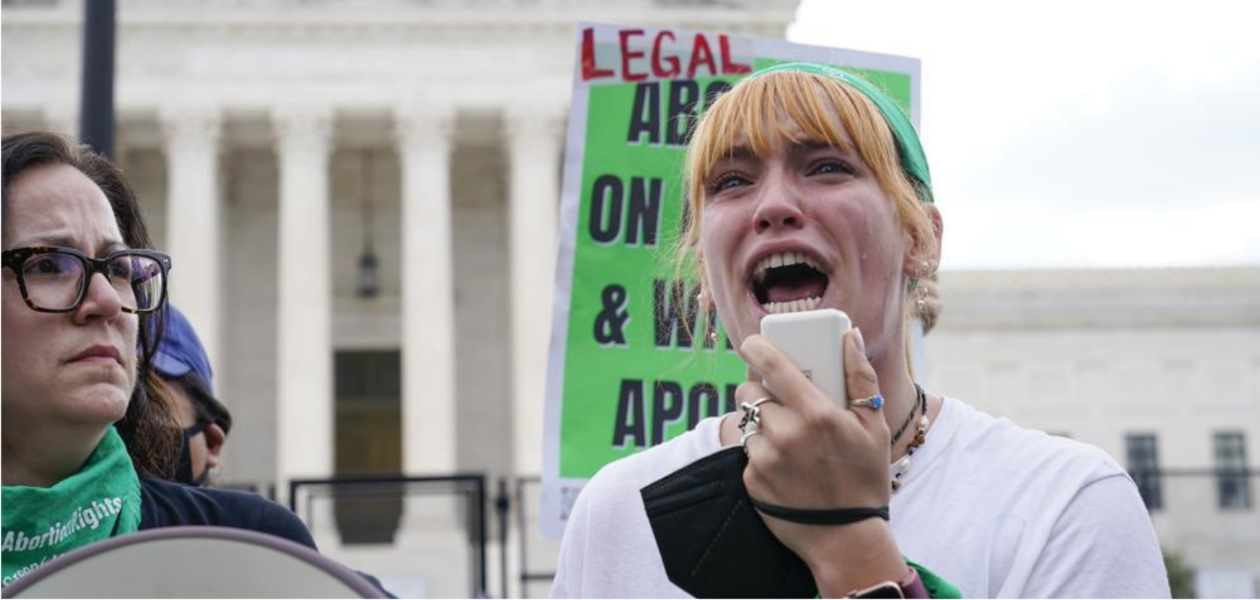
As expected, the Supreme Court of the United States has voted to overturn Roe v. Wade, the landmark ruling that legalized abortion across the nation nearly 50 years ago. The decision was already revealed in an unprecedented leak reported by Politico in early May, but now the nation has the final version of the majority opinion written by Justice Samuel Alito and circulated among the other justices in February.
The ruling marks the first time in U.S. history that a constitutionally-guaranteed right has ever been removed by the Court. But the extremists on the Court do not appear content with just killing abortion rights. Justice Clarence Thomas, a signatory to the decision, called for the Supreme Court to overturn other past rulings protecting same-sex marriage, gay sex, and the use of contraceptives.
The destruction of Roe is having immediate impact. In the state of West Virginia Friday morning, the last clinic in the state providing abortion services closed its doors. The sole clinic in Mississippi continued to provide services but was expected to stop at any time as right-wing protesters gathered outside. In Wisconsin, Planned Parenthood issued an order to stop abortion services at both of its clinics. Similar scenes are playing out across the country.

The decision strikes down both Roe v. Wade, the Court’s 1973 ruling that enshrined the constitutional right to an abortion, and a decision in 1992, in Planned Parenthood v. Casey, that essentially upheld that right.
Alito wrote: “Roe was egregiously wrong from the start. Its reasoning was exceptionally weak, and the decision has had damaging consequences. And far from bringing about a national settlement of the abortion issue, Roe and Casey have inflamed divisions in the country.”
Joining him in tossing Roe were Thomas and Justices Neil Gorsuch, Brett Kavanaugh, and Amy Coney Barrett. The latter three justices were appointed by former President Donald Trump. Thomas first voted to overrule Roe 30 years ago.
Justices Stephen Breyer, Sonia Sotomayor, and Elena Kagan—the last remaining Democratic appointees on the Court—dissented.
“With sorrow—for this Court, but more, for the many millions of American women who have today lost a fundamental constitutional protection—we dissent,” they wrote, warning that right-wing abortion opponents would now try to impose a nationwide ban “from the moment of conception and without exceptions for rape or incest.”
Though he did not sign their dissent, Chief Justice John Roberts voted with the liberal wing.
Protected by Roe no more
At least half the states in the country are expected to quickly make abortion completely illegal, with poor and working-class women and women of color in Republican-governed states having their rights stripped away first.
Abortion rights advocates say this will result in desperate people traveling to get abortions in states where the procedure remains legal, such as Illinois or New York. Some 13 states have “trigger laws” on the books which outlawed abortion the minute Roe was officially overturned.
In those places, the ruling marks a return to the time before Roe v. Wade, when abortion was a crime everywhere.
As late as the early 1970s, for example, police departments and governments around the U.S. were conducting crackdowns on what they called the illegal “abortion industry.” Almost totally forgotten these days are the vicious attacks against women in government-led terroristic campaigns.
The story of one such campaign, in Chicago, gained wide circulation again following the Politico leak. In the early ’70s, police came crashing down on “Call Jane,” a feminist collective of young women who, since 1965, had provided safe but then illegal abortions to roughly 3,000 Chicagoans per year. The collective, led by the famed civil rights and human rights activist Heather Booth, was raided after two Catholic women told police their sister-in-law planned to have an abortion provided by the group.
A homicide detective assigned to the case traced “Jane” to the South Shore neighborhood. There, police raided an apartment, arrested nearly 50 people for questioning, and tore three women who were actively undergoing abortion treatment away from their procedure and hauled them off to the hospital.

Seven women were charged with 11 counts of performing an abortion and conspiracy to commit abortion. They would soon be known in Chicago’s newspapers as the “Abortion Seven.” Members of Call Jane protected the women they served and prevented many of them from being arrested by eating the index cards that bore the details of the patients’ information.
There were similar cases across the country where working-class women went to incredible and dangerous lengths to access abortion or to protect those who needed them.
A woman working for the Parks Department in Brooklyn found a woman who performed her own abortion bleeding and dying in a ravine in Prospect Park. She was able to get the woman to the emergency room at a nearby hospital where her life was saved.
In 1973, the Abortion Seven had to be released by prosecutors when the Supreme Court issued Roe v. Wade. With the decision, the Court affirmed that access to safe and legal abortion was a constitutional right. It said that states could not ban abortion before 24 weeks into the pregnancy.
The nightmare of state harassment suffered by women in Chicago in the early 1970s may pale in comparison, however, to the level of surveillance and repression that will be deployed against women, non-binary people, and trans men seeking reproductive services in those parts of America where abortion is again illegal.
The data produced by cell phones, internet browsers, search engines, and social media could be used to prosecute those who seek abortions, and the heaviest crackdowns would undoubtedly descend on poor women and women of color.
Many people in the states where abortion is now illegal are unlikely to make, nor can they afford, the long, expensive, and health-endangering journeys that will be required. The poor, the young, and people of color will more likely be forced to turn to illegal methods, creating another racist feature in the already racist criminal justice system.
Now, stunned women’s rights activists fear prosecutions like that of the “Call Jane” collective will become business as usual.
Women as criminals
A national organization for defense attorneys has published a report that lays out a future in which the U.S. could undertake “rampant criminalization” and “mass incarceration on an unprecedented scale” in the name of “defense of the unborn.”
“States are laying the groundwork now, and have been laying the groundwork for criminal penalties that are completely different,” than the pre-Roe era, says Lindsay A. Lewis, a New York criminal defense attorney who co-authored a report on abortion for the National Association of Criminal Defense Attorneys (NACDL).

“They are so much more advanced and so much harsher than what existed before Roe was enacted.” State legislatures have spent recent decades “modifying their criminal codes” in ways that “completely change the calculus when it comes to what it would mean to go back to pre-Roe times,” according to Lewis.
Lawyers warn that the states where the procedure is illegal are laying the groundwork to go after even those women who travel to other states where it is legal in order to get abortions denied in their home states.
Criminal charges could come from specific abortion laws, but also from criminal codes that penalize “attempted crimes, conspiracies, and accomplices to crime, all relics of laws developed during the U.S.’ so-called ‘war on drugs.’ Those laws could subject a wide range of individuals to criminal penalties if Roe is overturned”, the NACDL report says.
They would include prosecuting people from states where the procedure is illegal who attempt to seek abortions in states where it remains legal.
For example, Louisiana law defines an “accomplice” to a crime as “anyone involved in its commission, even tangentially, whether present or absent if they aid, abet, or even counsel someone.” Lawyers say this could be used against a wide range of spouses, partners, friends, loved ones, or counselors, such as clergy or abortion fund networks, which help direct people or help transport them to clinics in places where abortion is still legal.
Turning dissent into action
The Court’s decision opens the way for a future Republican Congress and president to ban abortion entirely across the whole country. In the immediate weeks and months ahead, the decision is expected to set off an avalanche of legal challenges as the fight over abortion moves to state capitals and as Roe becomes a central issue in the November midterm elections.
President Joe Biden addressed the nation after the ruling was made official, calling Friday “a sad day for the Court and the country.” With Roe gone, he said, “the health and life of women across this nation are now at risk.”
The reaction from abortion rights, women’s equality, and other movement leaders was more stinging.
“The hands of time have once again been turned back,” said Congressional Black Caucus Chairwoman Joyce Beatty. “In the midst of a Black maternal mortality crisis, restricting access to abortion will disproportionately endanger the lives of Black Americans,” Beatty declared. “Let me be very clear: Government-mandated pregnancy is not pro-life, it is pro-policing of women’s bodies.”
In a statement sent to People’s World, Working Families Party spokesperson Nelini Stamp said: “Make no mistake, white Christian nationalists have been working towards this moment for 50 years. They have exploited the most anti-democratic features of our political system, from the courts to the Electoral College to the United States Senate. They have engaged in outrageous power grabs, bulldozed basic norms, and can’t be bothered to justify their hypocrisy. They know their views are unpopular, so they rig our democracy to enshrine minority rule, trampling our rights.”

Opinion surveys show a majority of Americans oppose overturning Roe and handing the question of whether to permit abortion entirely to the states. Polls conducted by The Associated Press-NORC Center for Public Affairs Research and others also have consistently shown that only about 1 in 10 Americans want abortion to be illegal in all cases. A majority are in favor of abortion being legal in all or most circumstances.
Laura Dewey, a leader of the Communist Party USA’s Michigan district, pointed to the 2022 elections as a frontline in the battle to stop the anti-abortion assault. She said, “We must help build the biggest backlash against the far right, one far larger than the right-wing backlash against Obama’s election, one comparable to the women’s uprising after Trump’s election. We need to be in the streets in the coming months and at the polling booths in November.”
She said that “a strike by women and trans men should be considered.”
Dewey called the decision “fascistic” in nature and connected it to other aspects of extremist Republican policy. “Along with the police violence against and the mass incarceration of Black and brown people and the wave of anti-voting laws, the reversal of Roe v. Wade signals the right’s determination to control and suppress human beings. It may very well be a sign of fascism to come unless we the people halt this frightening trend.”













Comments